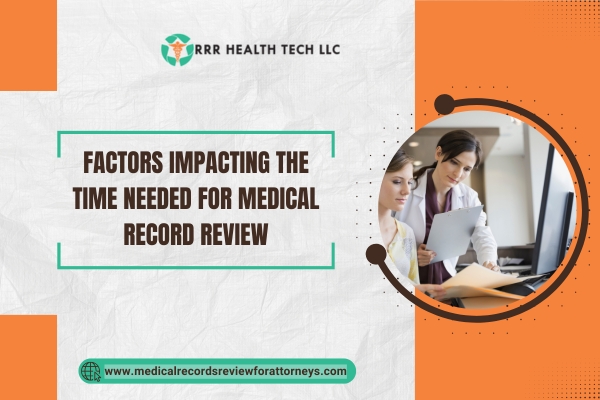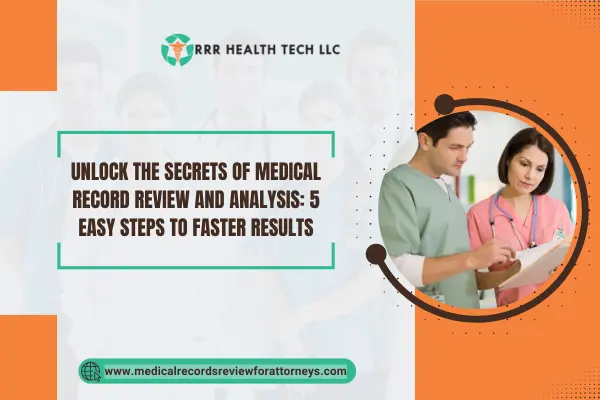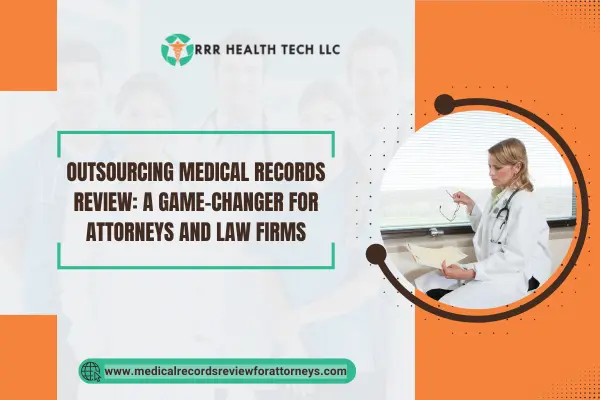
Introduction
In the domain of law, especially in personal injury and medical malpractice cases, the review of medical records must be performed in a regulated and precise manner. Grasping the influences that impact the time of medical record review can optimize case strategies and outcomes. This article attempts to explicate these influences with proposed resolutions considering the practical difficulties faced by lawyers in America.
Key Factors Affecting Medical Record Review Time
Complexity of Medical Records
• Number of Records: Comprehensive medical histories typically slow down the review process. More challenging cases usually contain multiple diagnostic imaging studies, treatment procedures, and physician notes.
• Medical Terminology: Challenging words also slow down the reviewing process unless familiarity exists with some part of the terminology relevant to the reviewer.
• Handwritten Documents: Rough handwriting may impede understanding of a patient’s medical history and could result in delay, misinterpretation, or inefficient error corrections.
Quality of Medical Records
• Heuristic Validity: Falsified records and vague abbreviation combine to increase the error rate, thus adding to the already tedious process of reviewing.
• Digital vs. Paper Records: In absence of computer records, access to data may be time-consuming. Because of time-consuming nature of the paper records, the review time may be increased.
Frequency of Updating Records
• Unmaintained Records: When the records are not kept up to date, there is a possibility that they are minimal or inaccurate, creating the need for redundant verifications.
• Sequential Order: Poorly ordered records tend to make it more complicated for a reviewer to understand the treatment history of the patient with respect to the sequencing of the process steps.
Qualification of the Reviewing Panel
• Relevant Expertise: The educational background and work history of the medical review team has an impact on the proficiency of the review process. A qualified team has the capability of dealing with intricate documents in controlled time frames.
• In-house Vs. Outsourced Reviews: Legal representatives retaining their own staff may have difficulties created from inadequate training concerning medical language and the anatomy of medical records.
Methods for Improving the Difficult Task of Medical Record Review
Delegating To Medical Record Review Companies
• Professional Help: Getting into contract with a medical record review company allows for improvement in efficiency. These companies work with competent people to manage sophisticated medical files in a timely manner.
• Availability of AI and other advanced tools: The efficiency improved even more with the introduction of artificial intelligence, capable of processing entire records in no time, cross checking documents for existence, and putting them in order systematically, even setting up timelines.
Adopting Best Practices
• Computerized Checklist: Use of standardized checklists for record-keeping in healthcare facilities enhances understanding and minimizes the time required for review.
• In-House Educational Workshops: Regular workshops for in-house staff teaching medical terms and techniques of records analysis often lead to better productivity.
Case Studies
Case Study 1: Personal Injury Claim
Overview: One of the attorneys claimed a client who was injured while at work.
Challenges: Medical records included a multitude of treatments and diagnostic tests remembered over a few months and were documented in great detail.
Solutions: The attorney outsourced the review to professional medical record review service that reviewed the records with embedded AI tools.
Case Study 2: Medical Malpractice Case
Overview: A client claimed that there was no appropriate attention paid to them during a surgical procedure.
Challenges: Unorganized and contradictory medical records complicated the review process.
Solutions: The attorney hired a medical review team that prepared a summary of the report, analyzed the contradictions to outline important excerpts and counter them.
Conclusion
It is equally important for the lawyers dealing with medical record reviews to understand the aspects that relate to time factors of medical record review. Employing expert services and observing best practices aids legal professionals in reducing the time taken for reviews thereby effectively improving the outcome of cases.


